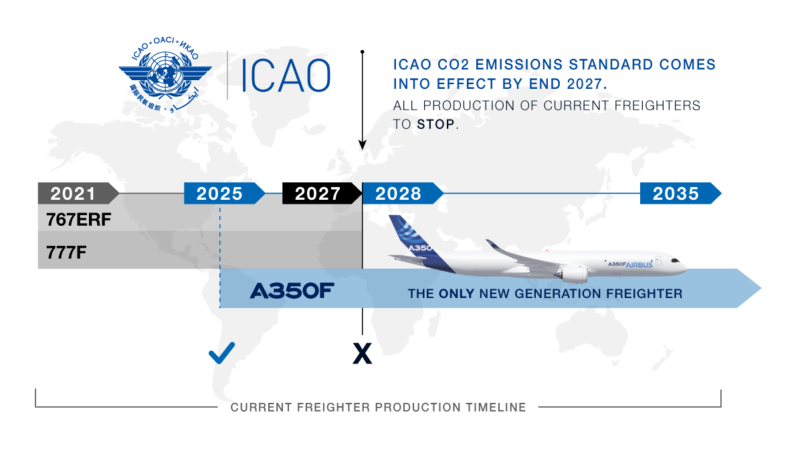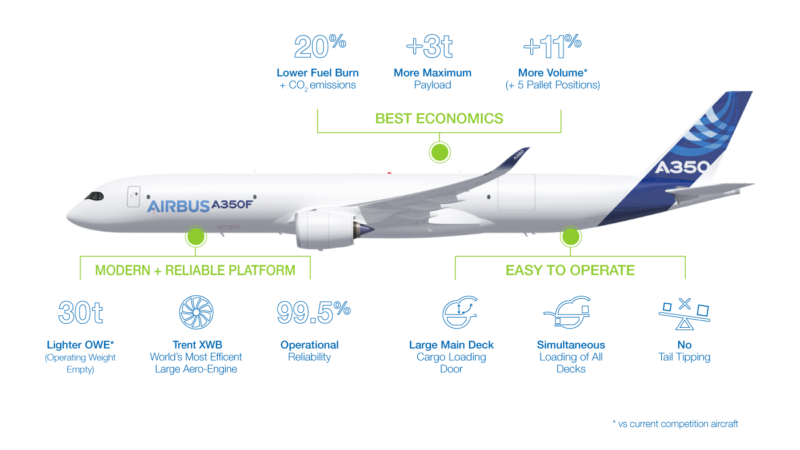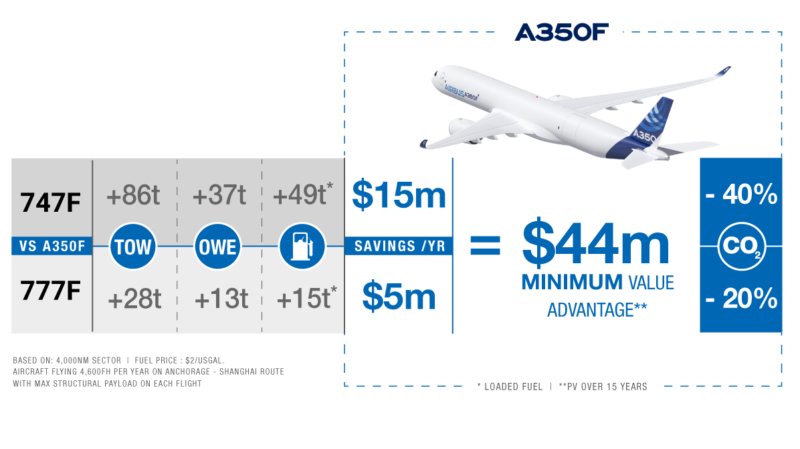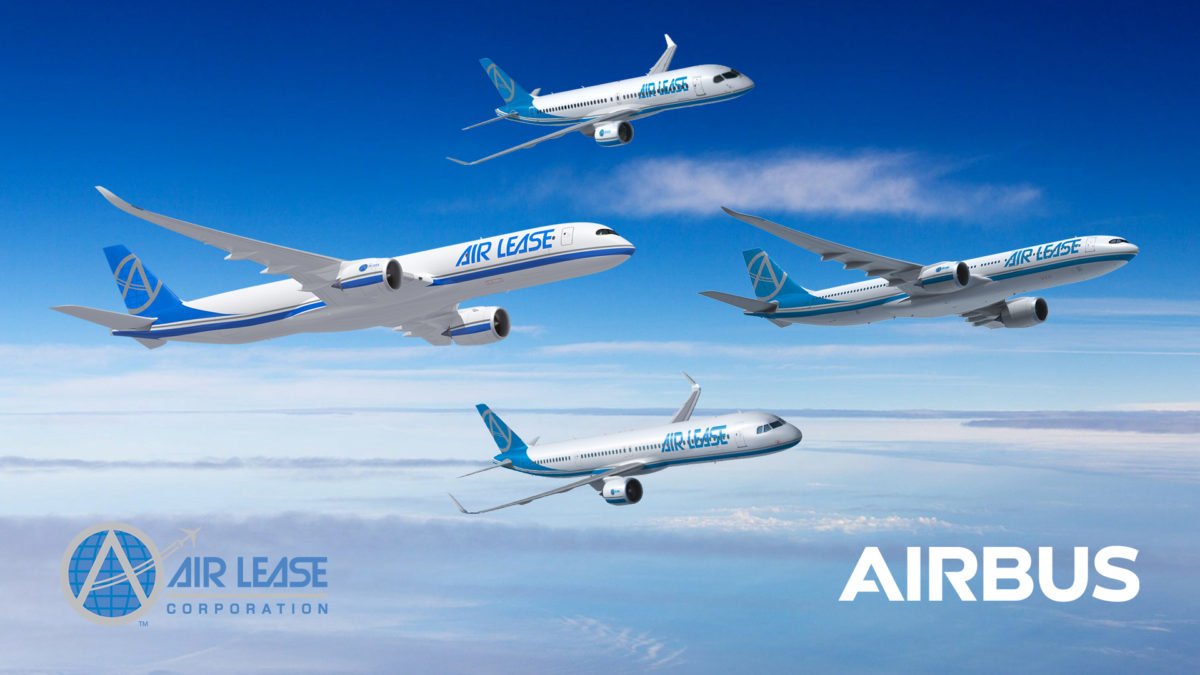The highly anticipated freighter variant of the A350 has been announced by Airbus at the 2021 Dubai Air Show, putting an end to years worth of rumours and speculation as to whether their flagship twin will gain another variant. American aircraft leasing company Air Lease Corporation was announced as the launch customer for the type, signing the dotted line for seven aircraft.
In addition to the seven freighters, Air Lease Corp also ordered 25 A220-300s, 55 A321neos, 20 A321XLRs and four A330neos, totalling 111 aircraft. The deal comes one day after Airbus secured another mammoth order from Indigo Partners for 255 aircraft.
”ALC was the launch customer for the very popular A321LR and XLR versions. Now, we become the launch lessor for the A350F and by far the largest lessor customer for the A220.”
Steven F Udvar-Hazy, Executive Chairman of Air Lease Corporation
A350 Freighter Specifications
Quietly listed on Airbus’ commercial freighter page a day before the show, the A350 Freighter boasts many compelling features; but will they be enough to tackle the upcoming Boeing 777X Freighter, converted freighter market and existing freighter platforms?
Airbus states that the A350 is the only freighter capable of meeting the latest ICAO CO2 requirements, which require production aircraft from 2028 to fall under the new CO2 limits. If and when Boeing launches the 777X, this statement could change.

The A330 Freighter was Airbus’ most recent attempt at taking some of Boeing’s lead, however it never took off. The A350F is Airbus’ boldest attempt at taking on the 777, 747 and the MD-11 freighters, which have dominated amongst the global air freight fleets.
In typical marketing fashion, online brochure specifications are very basic compared to what an airline would view when assessing a new aircraft type. However, for your viewing pleasure, here is what the A350 has to offer:
Compared to the Boeing 747 Freighter, the A350F offers a 40 percent reduction in CO2 emissions and fuel burn; however, with two less engines one would hope this is the case! As for similar freighters such as the 777 and 767 platforms, the advertised efficiency improvements is 20 percent.
But aside from efficiency, the aircraft offers the same volume as the 747F whilst also carrying three tonnes more payload than the 777F; all the while being able to fly the long distances you would expect. Leeham News and Analysis published an interview with Airbus Chief Commercial Officer Christian Scherer, ahead of the inconspicuous web launch, where it was specified that the aircraft can carry 109 tonnes of payload or four and half percent more than the 777F. The max takeoff weight of the aircraft comes in at 317 tonnes.

Compared to the 777F, the A350F is stated to be 20 tonnes lighter. This is mostly due to the fact that the passenger cabin has been removed and it is five frames shorted than the A350-1000, all the while still clocking in 6.9 metres longer than the 777F.
A strengthened deck and an enlarged aft loading door results in easier and and safer loading of the aircraft. The aft door helps prevent tail tipping events, as the bulk of the weight is loaded forward before the last pallets enter last.
Economics
What matters to an airline is how the aircraft performs on the bottom line. Airbus doesn’t think this will be an issue, but a lot of factors need to be taken into account.
The extra three tonnes of payload compared to the 777F is stated to add up to $21 million extra revenue. Additionally, having newer systems and half the engines of the 747 means the aircraft offers airlines a $16 million savings in maintenance. Lower landing fees and lower airport fees also contribute to a lower operating cost.

The A350F and A350 passenger variants share 100 percent engine parts commonality and 99 percent airframe commonality, meaning any new operators of the variant will have easy access to an established and proven parts network.
However with Boeing dominating the freighter business, convincing an airline to purchase new freighters that require an airline to completely retrain pilots, engineers, ground crews and more could be an uphill battle.
FedEx and UPS for example operate A300 based freighters, however, without Airbus’ common fly-by-wire flight decks, there is no commonality pitch to be used to convince the two airlines to switch. Regardless, their extensive relationship with Airbus means that the aircraft is definitely not off the table.
Making things more difficult is the growing amount of A330s and 777s that are being retired in favour of newer jets. Conversion specialists, with access to the proper tooling and equipment, will no doubt be aggressively pushing the option of A330 and 777 P2F aircraft to airlines.
Potential Customers
It is not yet clear who else Airbus has lined up for the A350, however a few clues have been circulated through social media and aviation media websites.
Just a few weeks ago an A350 passenger variant was seen flying in Toulouse with a Cargolux callsign. Could Airbus be trying to show off their new toy or have they secured an order? After all, Cargolux is an all 747 operator, which is what the A350F is targeting, alongside the 777F.
Other key customers would be those already operating the A350. Qatar Airways for example has been very vocal about new freighter models and has been a highlighted cheerleader for the 777X, with media reporting an order sparking from converted 777X passenger frames. Despite this, Qatar hasn’t forgotten about the A350F. In fact Qatar was the first to fly the A350 passenger model back in 2015, making them very familiar with the type.
Singapore Airlines and Lufthansa have also been touted as potential customers, but when launching a new freighter, which Airbus says was market led and not office developed, it is safe to say the product has been well discussed across all carriers interested in current and future fleet planning.
Boeing Response
Boeing has yet to respond to the A350F, however they certainly aren’t sitting on their hands.
In a recent Flight Global article, General Electric stated the next big thing for the GE9X ,the exclusive engine for the 777X program, is to develop a variant for the 777X Freighter. Boeing CEO David Calhoun has also stated that the next development for the 777X is a freighter variant, to help the company take their freighter product line into the next chapter of ICAO CO2 standards.
Specifications are mostly rumours at this stage, however the strongest evidence and most logical plan is to build the 777XF on the 777-8 variant; similar to how the current 777F is based on the 777-200LR.
Despite this, Boeing announced on the first day of the air show that they are not yet ready to launch the 777XF or offer to airlines. This may not be for long though as other reports confirm the company is in advanced talks with customers. They may instead opt to launch the freighter outside of the Dubai Air Show, especially with the aircraft slated to visit Doha (home of Qatar Airways) and Frankfurt (to visit Lufthansa).
Boeing Sales Chief, Ihssane Mounir, said in todays conference that they are still six years from the 2027 ICAO rule and that they have plenty of time to tweak and optimise the 777X Freighter.
Interestingly, Boeing is seeking an exemption from the 2027 ICAO requirements. Another option which has been discussed in the past is the idea of a re-engined 767F, which could also pave the way to a re-engined 767 tanker for future military proposals.
The 767X was last discussed back in 2019 when it was discovered that Boeing was contemplating a re-engined 767 not only for a modernised freighter program, but also to perform as a new passenger aircraft. If launched, the aircraft was said to be using General Electric GEnx engines that also power the 787.


